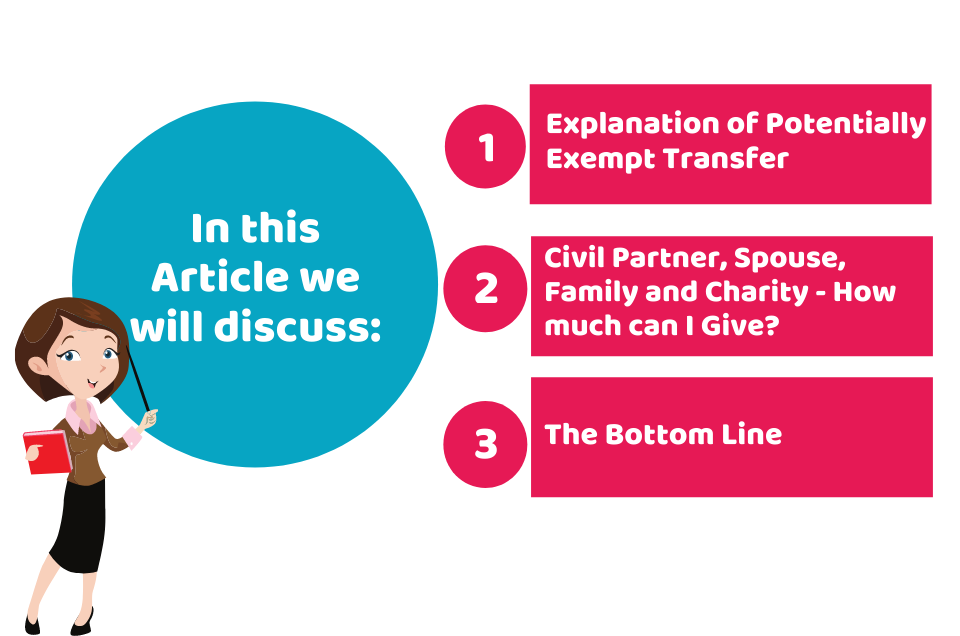
25/11/2021Accounting , Finance , Personal Tax , Taxation
It sounds like a great idea to gift your friends and family when you can enjoy the benefit of reduced estate value for inheritance tax purposes. This will immediately be advantageous for your own people as well. However, the potentially exempt transfer is a critical area and most people need professional help in order to ensure that they are avoiding any mistakes that might cause problems or loss in the future.
This is important to know that a non-cash gift like the property share can make you or the recipient pay the capital gain tax if you do it while you are still alive. Choosing the right adviser with professional help can help you and the recipient make the most out of the opportunity. Before we delve further into the discussion, let’s have a look at the focused points of discussion in today’s article:

- Explanation of Potentially Exempt Transfer
- Civil Partner, Spouse, Family and Charity – How much can I Give?
- The Bottom Line
Explanation of Potentially Exempt Transfer (PET):
PET is the abbreviation of potentially exempt transfer and primarily this allows a person to make a gift of unlimited worth that can later be exempted from the inheritance tax. The condition here is that the person tends to live for seven years after this.
In case the person does not live for the required time period, PET will be considered chargeable. This will result in adding the worth of the inheritance tax.
Moreover, there are certain conditions that needed to be met for a lifetime potentially exempt transfer. Such transfers are normally considered as a gift from one person to another person or to a trust. The important point to notice here is that the gift can’t be given to a company or a corporation.
Stuck with your accounts and looking for a helping hand? How about you get our guys on a quick call. We love talking about taxes, payroll management and any opportunities that help you expand your prospects. Call us on 020 8686 8876 or email us today.
Civil Partner, Spouse, Family and Charity – How much can I Give?
It is allowed to the civil partners and the married couples that they pass their estate to their partner or spouse tax-free after the demise. In simple words, we can consider this fact as that the living spouse or partner can have the tax-free benefits of the whole estate without worrying about the inheritance tax IHT.
Moreover, the unused tax-free allowance can also be transferred to the surviving spouse or partner. For instance, a husband dies and the wife has the right to enjoy the entire estate, she can now add her husband’s tax-free allowance to her allowance as well.
In the case of the unmarried partner, there is a slight difference which means that they have to pay the inheritance tax.
Making gifts to family and children: This will depend totally on you, however, it is important to plan correctly. As mentioned above the family members and children will not be accountable for paying inheritance tax if you survive after seven years of making the gift. Make sure you make a record of the following if you intend to give money or gifts to your friends and family:
- The worth of the gift
- The time when you make the gift
- The person you plan to give the gift
- A clear defined explanation of the gift or asset.
Coffee, cookies and taxes. What a perfect match. Get in the car, and reach our Croydon office today. Call us on 020 8686 8876 or email us to book your initial free one-hour basic consultation to discuss your requirements. We’ll make sure that we get all your documents submitted on time. Talk to our guys today!
Charity in Will: In case you decide to leave your money or physical asset for a charitable body, you can do it either in your lifetime or through your will. This will be exempt from inheritance tax. This will also help to reduce the IHT rate but if the condition of 10% of the net estate is met. This complex point will require professional help to make a qualifying gift.
The Bottom Line:
Now that you have developed a better understanding of potentially exempt transfer, we can sum up the discussion by saying that it is suggested that the decision of making a gift should be considered with professional help due to the complexity of this area. This will help to ensure that the gift will qualify and you can benefit the most out of it.
Can’t find what you are looking for? why not speak to one of our expert’s accountants in London and see how we can help you are looking for.
Disclaimer: This article intends to provide general information based on potentially exempt transfers and relevant details.

